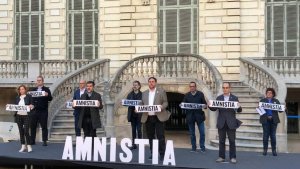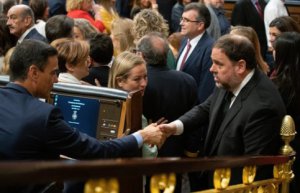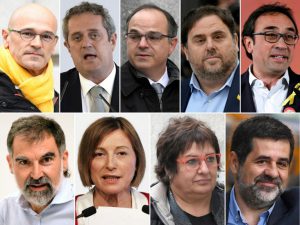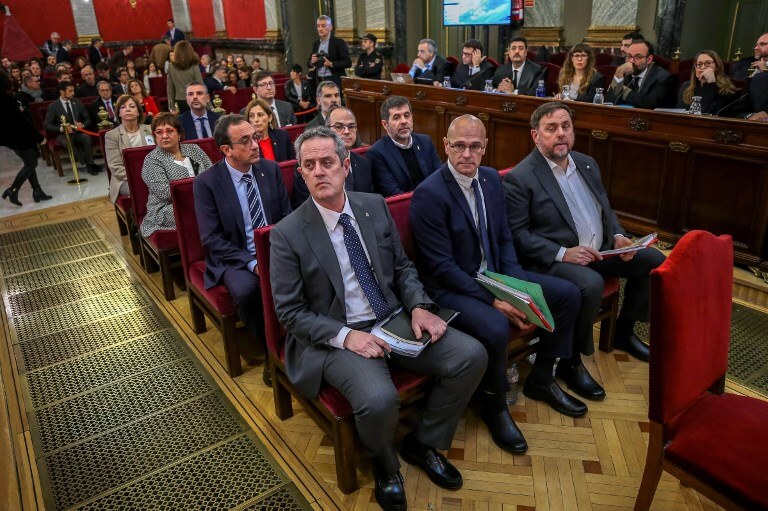With the Spanish coalition government (PSOE–Podemos) led by socialist Pedro Sánchez currently considering granting pardons to the nine jailed pro-independence Catalan leaders, Spain’s right-wing and far-right opposition parties are preparing a legal and political battle, as well as another rally, in order to try and prevent it from happening.
The nine Catalan politicians and activists were jailed for between 9-13 years by the Supreme Court on 14 October 2019. They were convicted for crimes of sedition and misuse of funds for their roles in the October 2017 independence referendum. The verdicts caused widespread protests across Catalonia.
Last Tuesday, Sánchez said that he would be making a decision regarding pardons for the jailed leaders in accordance with the constitutional values of ‘concord, dialogue, understanding’, while rejecting ‘revenge’. The prime minister said he wanted to overcome ‘a crisis that cracks Catalan society’ and return to ‘co-existence’.
On Wednesday, however, the Spanish Supreme Court issued a report to say that it opposes granting pardons to the jailed leaders. But stemming from an 1870 law, it is ultimately down to the Spanish government to decide whether to grant them. The government previously said it was waiting for the non-binding report from the Supreme Court to make its decision.

The court said that it considered there were no reasons based on ‘justice, fairness or public utility’ to grant pardons to the jailed leaders. Magistrates considered the prison sentences of 9-13 years imposed to be proportionate and emphasised that there is ‘no evidence of remorse’.
The report, which was presented by the president of the Supreme Court’s criminal chamber, Manuel Marchena, stated that the reasons for asking for a pardon lose justification ‘when those who have been the perpetrators of a mobilisation aimed at presenting themselves as political prisoners to unilaterally subvert the constitutional order’.
Ever since Sánchez came to power in Madrid with the support of pro-independence parties, and re-elected thanks to an abstention from Catalonia’s Esquerra Republicana (ERC) party, the right-wing opposition groups have accused his cabinet of ‘secret dealings’, and offering pardons as a possible thanks for helping to appoint him as prime minister. Sánchez has always denied the accusations, stating that his government would make the same decision even if they had an absolute majority of 300 MPs.
During last week’s Spanish Congress plenary session, Pablo Casado, leader of the main opposition group, the right-wing People’s Party (PP), said that Sánchez ‘prefers to put Spain’s constitutional order at risk in exchange for remaining in power’.

Casado accused the prime minister of having ‘lied’ to the Spanish people to win the elections and of having ‘betrayed his word, and the code of ethics of the Socialist party’. He said Sánchez ‘prefers to jeopardise the continuity of constitutional Spain in exchange for remaining in power.’
‘He wants to pardon those who have attacked the law, broken the concord, and blew up co-existence,’ Casado stated. He said Sánchez ‘is prime minister of Spain thanks to those who want to end Spain’, referring to the abstention agreement between the PSOE and pro-independence ERC group.
In response, Sánchez said that, ‘there’s a time for punishment and a time for concord’. Sánchez explained that he had supported dissolving Catalan sovereignty in the aftermath of the 2017 independence push and imposing direct rule from Madrid ‘to defend the territorial integrity of the country and because I understood that it was a matter of state’. He added: ‘I wish I had the loyalty that Mariano Rajoy (former PP Spanish prime minister) received from the Socialist party.’

PP officials announced on Thursday that the group would file motions in all town councils across Spain to symbolically reject the jailed leaders’ pardons, as a means to force local officials of Sánchez’s PSOE party to take sides on the issue and risk political backlash from their electorate.
Meanwhile, the far-right Vox party is fiercely opposed to the Spanish government potentially pardoning the jailed leaders, threatening to ‘mobilise the population’ if it happens. ‘We will exert as much pressure as we can on the street and we will directly oppose pardons,’ the party’s spokesperson in Congress, Iván Espinosa de los Monteros, said.
The leader of Vox in Catalonia, Ignacio Garriga, said on Thursday that the party would press criminal charges against Sánchez and his ministers if they end up authorising the pardons, stating that the measure would pose ‘a direct attack to millions of Catalans.’
Vox was the so-called ‘popular prosecutor’ in the trial of the Catalan independence leaders, a mechanism in Spain which allows any citizen or organisation to be an accuser in court alongside public prosecutors. After the trial, the far-right group expressed disappointment with the verdict, claiming the sentences were not harsh enough. Vox had asked that the Catalan leaders be jailed for rebellion rather than the lesser crime of sedition – and had called for 74 years in jail for Oriol Junqueras. He finally received a sentence of 13 years.
The PP and Vox groups are taking part in another rally in the Plaza Colon in Madrid on 13 June to reject the pardons. It follows a previous rally held in February 2019 in support of the unity of Spain, and in which the right-wing and far-right leaders were infamously photographed together.

Not only is Sánchez under pressure from the opposition, but also from within his own party – a reflection of the divided views on the issue across Spain. Criticism has also came from one of Sánchez’s predecessors, the former Socialist leader Felipe González, who said he would not grant pardons under the current circumstances.
The PSOE president of the Valencia region, Ximo Puig, is in favour of granting pardons, stating that there is ‘no other route’. However, Emiliano García-Page, PSOE president of Castilla La Mancha, has said that the solution ‘can only come when pro-independence [parties] renounce their goals,’ telling Sánchez he still ‘has time’ to change his mind.
Also from the PSOE, Guillermo Fernández Vara, president of Extremadura, has said: ‘Obviously, you should not pardon people who don’t want to get pardoned, and who don’t respect or believe in law.’ Meanwhile, the Basque Country’s regional president Iñigo Urkullu said that they would be ‘on the list of the best-justified’ pardons of all those granted by a Spanish government in the last 40 years.

The PSOE’s coalition partners in the Spanish government, anti-austerity Podemos, have called the pardons ‘an essential first step’ in resolving the Catalan political conflict.
On Sunday, Spain’s El Pais newspaper reported that Sánchez plans to approve the pardons in a cabinet meeting around the start of July. According to the paper, the cabinet will grant ‘partial’ and ‘reversible’ pardons, meaning that the leaders will have the remaining years of their sentences reduced and will no longer need to spend time in jail – but the pardons could be lifted if they are found guilty again.
In January 2020, the government led by Sánchez also announced it would be seeking to modify the crime of sedition, and intended to include it among other proposed reforms to the criminal code to present to the Spanish Congress. It is understood that this is still in process, and which could also provide a more solid legal foundation for the pardons, and to avoid any actions taken by PP and Vox to challenge them.
The Catalan pro-independence groups have persistently sought an amnesty law for the jailed leaders, rather than pardons – in order to nullify the Supreme Court verdict that sentenced their leaders for sedition. They also continue to demand the right for self-determination.
‘We will clearly not oppose any measure that could alleviate the pain of prisoners, their families, and society,’ Catalonia’s new president, Pere Aragonès, said on Wednesday, before stressing that an amnesty would be what most Catalans want.
Click here for all our reports related to Catalan independence, as well as the Catalan trial, verdicts and sentencing.
Sign up for the FREE Weekly Newsletter from Spain in English.
Please support Spain in English with a donation.
Click here to get your business activity or services listed on our DIRECTORY.
Click here for further details on how to ADVERTISE with us.



